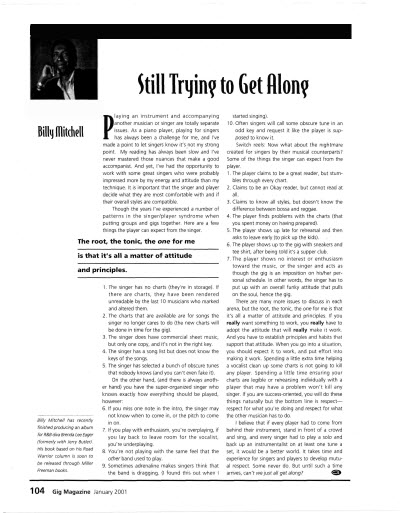Gig Magazine | Still Trying to Get Along
 Still Trying to Get Along
Still Trying to Get Along
By Billy Mitchell
JANUARY 2001
Playing an instrument and accompanying another musician or singer are totally separate issues. As a piano player, playing for singers has always been a challenge for me, and I’ve made a point to let singers know it’s not my strong point. My reading has always been slow and I’ve never mastered those nuances that make a good accompanist. And yet, I’ve had the opportunity to work with some great singers who were probably impressed more by my  energy and attitude than my technique. It is important that the singer and player decide what they are most comfortable with and if their overall styles are compatible.
energy and attitude than my technique. It is important that the singer and player decide what they are most comfortable with and if their overall styles are compatible.
Though the years I’ve experienced a number of patterns in the singer/player syndrome when putting groups and gigs together. Here are a few things the player can expect from the singer.
The root, the tonic, the one for me is that it’s all a matter of attitude and principles.
- The singer has no charts (they’re in storage). If there are charts, they have been rendered unreadable by the last 10 musicians who marked and altered them.
- The charts that are available are for songs the singer no longer cares to do (the new charts will be done in time for the gig).
- The singer does have commercial sheet music, but only one copy, and it’s not in the right key.
- The singer has a song list but does not know the keys of the songs.
- The singer has selected a bunch of obscure tunes that nobody knows (and you can’t even fake it).
On the other hand, (and there is always another hand) you have the super-organized singer who knows exactly how everything should be played, however:
- If you miss one note in the intro, the singer may not know when to come in, or the pitch to come in on.
- If you play with enthusiasm, you’re overplaying, if you lay back to leave room for the vocalist, you’re underplaying.
- You’re not playing with the same feel that the other band used to play.
- Sometimes adrenaline makes singers think that the band is dragging. (I found this out when I started singing).
- Often singers will call some obscure tune in an odd key and request it like the player is supposed to know it. Switch reels: Now what about the nightmare created for singers by their musical counterparts?
Some of the things the singer can expect from the player.
- The player claims to be a great reader, but stum bles through every chart.
- Claims to be an Okay reader, but cannot read at all.
- Claims to know all styles, but doesn’t know the difference between bossa and reggae.
- The player finds problems with the charts (that you spent money on having prepared).
- The player shows up late for rehearsal and then asks to leave early (to pick up the kids).
- The player shows up to the gig with sneakers and tee shirt, after being told it’s a supper club.
- The player shows no interest or enthusiasm toward the music, or the singer and acts as though the gig is an imposition on his/her per sonal schedule. In other words, the singer has to put up with an overall funky attitude that pulls on the soul, hence the gig.
There are many more issues to discuss in each arena, but the root, the tonic, the one for me is that it’s all a matter of attitude and principles. If you really want something to work, you really have to adopt the attitude that will really make it work. And you have to establish principles and habits that support that attitude. When you go into a situation, you should expect it to work, and put effort into making it work. Spending a little extra time helping a vocalist clean up some charts is not going to kill any player. Spending a little time ensuring your charts are legible or rehearsing individually with a player that may have a problem won’t kill any singer. If you are success-oriented, you will do these things naturally but the bottom line is respect— respect for what you’re doing and respect for what the other musician has to do.
I believe that if every player had to come from behind their instrument, stand in front of a crowd and sing, and every singer had to play a solo and back up an instrumentalist on at least one tune a set, it would be a better world. It takes time and experience for singers and players to develop mutu al respect. Some never do. But until such a time arrives, can’t we just all get along?